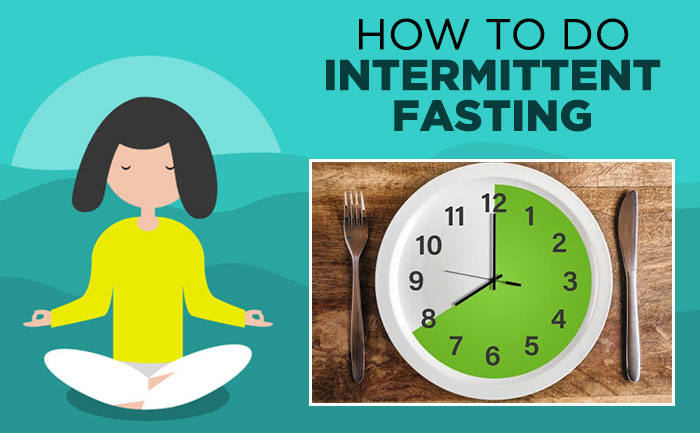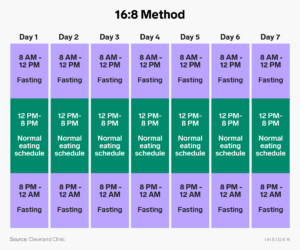- Sponsored -
How to do intermittent fasting: Everything from facts, procedure to benefits
Do you know the heavenly benefits of fasting? If not, then here you on a journey to discover some amazing facts about intermittent fasting, a new age phenomenon to losing weight and gaining health. Here's a detailed guide to intermittent fasting for beginners and its benefits

Many people wonder what’s so special about Intermittent Fasting(IF)? Supporters of intermittent fasting suggest that fasting daily at a set amount of time has many benefits. It heals the body and also cures chronic diseases. It can prevent several conditions such as high blood pressure, diabetes, heart conditions, a few types of cancer, neurodegenerative diseases, detoxifies the body while flushing out the toxins. For over the last few years the term intermittent fasting has become a global phenomenon. In order to seek these benefits of fasting, one also needs to follow other rules of diet and exercise. If this type of fasting is done in the wrong way or with half knowledge, one can start facing serious health issues. Thus knowing everything about this daily fasting regimen is crucial. Here we take you through the benefits, procedure, pros and cons, facts about daily fasting.
- Sponsored -
What is Intermittent Fasting?
People eat in a set window and fast daily (generally during sleep hours) while following the intermittent ways of fasting. The aim is to control the junk intake and to allow the body to heal itself. 16:8 intermittent fasting is one of the most popular types of fasting today, wherein the eating window is 8 hr and 16 hrs are for regular fasting. One needs to keep a track of the changes happening in the body, consume healthy food and keep themselves hydrated during the cycle.

How to do Intermittent Fasting:
There are many free fitness applications that let you draft your schedule for Intermittent Fasting. From setting time reminders to tracking your new habit, some cool features help you out. There are different types of following Intermittent Fasting regimens. Here are few types:
- 16:8 intermittent fasting – daily fasting for 16 hrs and eating in 6 hrs window
- 5:2 diet – typically involves eating for 5 days of the week and restricting the calorie intake to 500–600 for 2 days of the week
- Eat-stop-eat -involves a 24-hour fast once or twice per week
- Alternate-day fasting – involves heavy eating for one day and fasting for another complete day
- Spontaneous meal skipping – involves simply skipping skip meals from time to time

Facts about Intermittent Fasting:
While following the intermittent fasting regimen, several changes take place within the body. From a cellular and molecular level, the body starts healing itself. From day one itself, the body starts to adjust its hormone levels to make stored body fat more accessible. Using the extra stored fat is crucial in losing weight and keeping the body physically fit. After fasting for more than 16 hrs, the body cells also initiate important repair work while exchanging their nutritions.
One needs to consume a nutrition-based diet alongside fasting for a long period. The nutritional support promotes muscle gain, while fasting leads to stored fat loss. Intermittent fasting also dramatically drops down the body’s insulin level, which is required to make stored body fats more accessible for the organs. The body steps into the autophagy phase, wherein body cells kickstart removing dysfunctional proteins and rejuvenate itself.

What to eat during Intermittent Fasting?
Generally, nutritionists and doctors suggest eating high-fiber foods, which include nuts, beans, fruits and vegetables, and high protein foods (also including meat, fish, tofu and milk), during the eating window hours. It is important to note that people need to drink a good amount of water while fasting because there involve detoxifying activities. Through body sweat and urine, these toxins are eliminated at a great level during the fasting phase. One can also consume healthy juices. The lunch and the dinner need to have a high 60 per cent of vegetables and fruits, while 40 per cent of grain-based food. This makes food to digest easily and it gives the organs required nutritions.

Benefits of doing Intermittent Fasting?
- Help reduce weight
- Blood sugar levels in control
- Blood pressure in control
- Levels out bad cholesterol
- Helps treat Alzheimer’s disease
- Helps treat Arthritis
- Helps in the treatment of Asthma
- Helps in the treatment of multiple sclerosis
- Prevents stroke
- Boost immune system
- Helps with anti-aging
- Boost brain health

Con’s of doing Intermittent Fasting?
- Can make you feel tired and moody during the initial days of fasting
- Skipping meals can cause Headaches, Dizziness or Nausea
- Restrictive eating can lead to disordered eating
- If not taken required amount of nutrition during eating window, this might lead to nutritional deficiencies

Who should avoid doing Intermittent Fasting:
People having any medical conditions should first consult their doctors before opting for any type of fasting routine. Here’s the list of people who should avoid fasting:
- People already suffering from underweight
- Pregnant or breastfeeding women
- Children with nutritional deficiencies
- People suffering from eating disorder
- Diabetes patients
- People with low blood pressure
- People suffering from any major ailments

Frequently asked questions about Intermittent Fasting:
Isn’t it unhealthy to skip breakfast during Intermittent Fasting?
While following the Intermittent Fasting routine, you still can have your breakfast during the eating window cycle. Break your night-long lasted fast with healthy food once you ring in the eating window. You can also divide your breakfast, lunch and dinner during the 8-hr eating window. But make sure you don’t overeat.
Is it safe to work out while fasting?
Yes, it is absolutely safe to work out while fasting also. Studies have shown that exercising during the fasting phase takes the benefits to a whole new level, especially if people are fasting for weight loss. It not only uses stored body fats but also boosts the body’s rejuvenation process. However, keep in mind that you don’t force your body to work out when you are drained out. Workout only when you feel being capable.
Does Intermittent Fasting cause muscle loss?
Almost all types of fasting cause muscle loss. While doing Intermittent Fasting, you need to maintain good protein content in your diet. According to the studies control eating and fasting regularly causes less muscle loss than regular calorie restrictions. So, always exercise while fasting and consume a good amount of protein. Include eggs, grains, nuts, green vegetables in your diet.
Why do I feel low fasting?
Low blood sugar while following the Intermittent Fasting routine can make you feel tired and weak during the initial few days. It might also lead to sleep disturbances for a few. However, these side effects only last for few days. Once your body becomes comfortable with the new diet regimen, it slowly adapts to the changes. Some studies show that Intermittent Fasting can actually reduce fatigue. It purifies the blood which then makes the organs and body parts more active. People who fast for a longer time often express feeling light and fresh.
For more such updates, stay hooked on to The Live Mirror.
Also Read: Navratri 2019: 10 Navaratri Special Foods You Can Enjoy While Fasting
- Sponsored -
